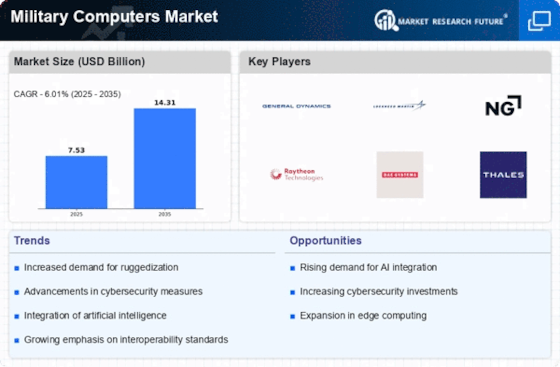Top Industry Leaders in the Military Computer Market

Strategies Adopted: Key players in the Military Computers Market employ various strategies to maintain their competitive edge and capitalize on market opportunities. These strategies include:
Technological Innovation: Companies invest heavily in research and development to develop advanced computing solutions tailored to the demanding requirements of military environments, such as ruggedized hardware, secure operating systems, and advanced data processing capabilities.
Strategic Partnerships and Collaborations: Collaborations with defense agencies, government organizations, technology partners, and industry stakeholders help companies access new markets, expand their product portfolio, and stay abreast of emerging trends and technologies.
Focus on Customization and Integration: Companies offer customizable computing solutions tailored to the specific requirements of military end-users, including integration with command and control systems, sensor platforms, and communication networks, to enhance interoperability and mission effectiveness.
Global Expansion: Key players focus on expanding their geographical footprint by establishing subsidiaries, manufacturing facilities, and service centers in strategic locations to better serve their customers and capitalize on regional opportunities.
Key Players:
Raytheon Company (US)
Safran Group (France)
Thales Group (France)
Cobham PLC (UK)
Curtiss-Wright Corporation (US)
Elbit Systems Ltd (Israel)
Collins Aerospace (US)
Getac Technology Corporation (Germany)
Northrop Grumman Corporation (US)
Panasonic Corporation (US)
Zebra Technologies Corporation (New Zealand)
General Dynamics Corporation (US)
Saab AB (Sweden)
BAE Systems (UK)
L3 Technologies Inc. (US)
Factors for Market Share Analysis: Several factors contribute to the analysis of market share in the Military Computers Market, including:
Product Performance and Reliability: The performance, reliability, and durability of military computers play a critical role in determining market share, with companies offering high-quality, mission-critical solutions gaining a competitive advantage.
Technological Differentiation: Companies that differentiate themselves through technological innovation, such as enhanced processing power, ruggedized design, and secure communication capabilities, often capture a larger market share by meeting the evolving needs of military customers.
Customer Relationships: Strong relationships with defense agencies, government organizations, prime contractors, and system integrators enhance market share by fostering trust, loyalty, and long-term partnerships, leading to repeat business and referrals.
Regulatory Compliance: Compliance with stringent military standards, specifications, and regulations, such as MIL-STD-810 and MIL-STD-461, is essential for gaining market share and securing contracts in the defense sector.
New and Emerging Companies: In addition to established players, new and emerging companies are entering the Military Computers Market, bringing innovative technologies and solutions. These companies often focus on niche segments or disruptive technologies, challenging traditional players and driving innovation in the industry. Some notable new and emerging companies in the market include:
Mercury Systems, Inc.
Crystal Group Inc.
Kontron AG
Trenton Systems, Inc.
CP Technologies LLC
Annapolis Micro Systems, Inc.
Industry News and Current Company Investment Trends: Recent developments and investment trends in the Military Computers Market reflect a growing focus on ruggedization, cybersecurity, and multi-domain operations. Key highlights include:
Advancements in Ruggedization: Companies are developing ruggedized computers capable of withstanding extreme environmental conditions, such as temperature extremes, shock, vibration, and electromagnetic interference, to ensure reliable operation in harsh military environments.
Focus on Cybersecurity: Companies are enhancing the cybersecurity capabilities of military computers, incorporating features such as hardware-based encryption, secure boot, and intrusion detection, to protect sensitive data and prevent cyber threats from compromising mission-critical systems.
Integration of Artificial Intelligence: Integration of artificial intelligence (AI) and machine learning (ML) algorithms enables advanced data analytics, autonomous decision-making, and predictive maintenance capabilities, enhancing the performance and efficiency of military computing systems.
Emphasis on Multi-Domain Operations: Companies are focusing on multi-domain operations, integrating land, air, sea, space, and cyberspace capabilities into a unified battlefield network, to provide military commanders with real-time situational awareness and decision support capabilities.
Overall Competitive Scenario: The Military Computers Market is highly competitive, characterized by technological innovation, strategic partnerships, and regulatory compliance. Established players leverage their experience, expertise, and global presence to maintain market leadership, while new entrants disrupt the market with innovative solutions and agile strategies. As the industry continues to evolve, companies that focus on technological differentiation, customer-centricity, and global expansion will thrive in the competitive landscape of the Military Computers Market.











